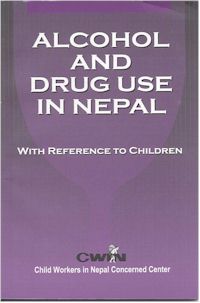Nepal Alcohol Study Presented
"Alcohol and Drug Use in Nepal With Reference to Children" is the title of the report released in Kathmandu in June. This survey was conducted by Child Workers in Nepal (CWIN) in co-operation with the Thribhuvan University as part of the Local Action programme.
 |
| Nepal-report: Alcohol and Drug Use in Nepal with Reference to Children |
More than 150 representatives from NGOs, government institutions, the University and others came for the presentation of the report. This is the first large-scale study of this type in Nepal, covering about 2,400 households in 16 of Nepals 70 districts. Quantitative information was obtained from household surveys (questionnaires) and qualitative information from case studies and key informant interviews. In addition 480 children between 10 and 17 years from the households were interviewed. Samples were taken from both rural and urban areas as well as all ecological and development regions. Most studies so far in Nepal has provided only little and fragmentary information on the use of alcohol and drugs.
This study departs from other studies in four ways. Firstly, it provides baseline information on the use of alcohol, tobacco and other drugs across different strata of the population. Secondly, it aims to understand the extent, context and patterns of consumption. Thirdly, it examines the impact of the use of alcohol and drugs on childrens lives including the level of childrens own initiation and consumption. Finally, it intends to identify social counter forces and intervention strategies to reduce and prevent harmful use of alcohol and other drugs.
About 60 per cent of the adult population in Nepal have experienced alcohol. 38 percent of the total adult population are regular users. More men than women drink alcohol. Jand/chang (home brews fermented from grains), home made raksi (distilled liquors made from grains or unrefined sugar) and local raksi (locally produced liquor for commercial purpose) are the most common drinks. Distillery products and foreign products are also commonly used, and almost 45 percent of the respondents who drink alcohol have experienced beer. One third have experienced distillery products and less than one fifth have experienced foreign products.
The adult respondents perceived the impact of family members use of alcohol and drug on children as violence and physical abuse (33.4%), neglect and mental abuse (28.5%), deprivation from education (20.2%) and push factor for children to use intoxicants (11.1%), malnutrition and running away from home. Broadly, the impact of alcohol use on childrens life can be categorised into social impact and economic impact. 35.9% of the children feel that there is an impact of parental drinking on the family. The impact included domestic violence (40%), loss of wealth and indebtedness (27.8%), loss of social prestige and bad relationship with neighbours.
About 17 in 100 children aged 10-17 had taken alcohol once or more during the last 12 months, boys more so than girls (22% vs. 11%). One half of those Nepalese children who drink initiated alcohol before age 13. Traditional and cultural occasions appear to be the most important occasion of initiating alcohol.
Livelihood of the household is associated with the production of alcohol. One third of the sample households were producing alcohol at their home, mostly for feasts and festivals. At the national level, the economic contribution of alcohol is substantial. According to data from the VAT office, the revenue generated from alcohol is as much as 6 percent of the GDP
You may download the report (PDF):
Alcohol and Drug use in Nepal; with Reference to Children
or contact FORUT to order it: forut@forut.no
RELATED ARTICLES
- Public health advocates urge Global Fund to end Heineken partnership
- Intervention gives reduced drinking, aggression and violence
- Nepal passes new National Alcohol Policy
- Blue Cross Lesotho includes discussions on masculinity in their treatment programme
- Powerful reminders of the many real effects of alcohol consumption
- Alcohol policy will impact HIV/AIDS epidemic
- National policy alliance and advocacy manual launched
- New policy programmes and a new leadership
- Alcohol and HIV/AIDS
- Prevention Works
